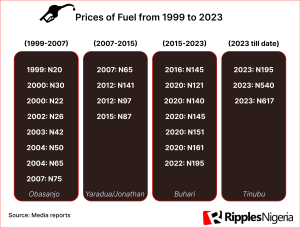Fuel Crisis Escalates: NNPCL and Dangote Clash Over Petrol Pricing
A pricing dispute between NNPCL and Dangote Refinery has worsened Nigeria’s fuel crisis. Trucks sit idle at depots across the country. This standoff threatens to increase fuel shortages and prices.

The clash stems from disagreement on who sets petrol prices. Dangote Refinery wants government agencies to decide. NNPCL argues for market-driven pricing. This debate has left fuel trucks unable to load or distribute petrol.
Anthony Chiejina of Dangote Group said, “We can’t set prices. It’s up to the government.” NNPCL’s Olufemi Soneye countered, citing laws that support free market pricing.
Energy expert Henry Adigun predicts higher fuel costs. He estimates production costs at N750 per liter, potentially rising to N800. “Cheap petrol is not coming back,” Adigun warned.

An unnamed presidential aide criticized Dangote’s stance. They suggested the company wants to avoid public backlash over high prices. “Petrol might cost N1,000 per liter,” the aide claimed.
Industry experts worry about Nigeria’s fuel market deregulation. Professor Wumi Iledare calls for a “willing seller, willing buyer” system. He urges regulators to prevent NNPCL from monopolizing Dangote’s petrol.
NACCIMA President Dele Oye warns of market volatility. He fears letting market forces determine fuel prices could lead to instability.

Ordinary Nigerians face uncertainty over fuel prices and supply. Many fear higher costs will strain already tight budgets. The crisis highlights challenges in Nigeria’s shift to a market-driven energy sector.
Critics point to a lack of clear rules. They say this gap allows big players like NNPCL and Dangote to sway the market. Some call for more transparent pricing to build trust.
The government faces pressure to step in. They must clarify how fuel prices are set. The outcome could shape Nigeria’s energy future and economic stability.
For now, Nigerians wait and watch. The resolution of this dispute will impact the country’s energy reform plans. It may determine if Nigeria can create a stable, market-driven fuel economy.

